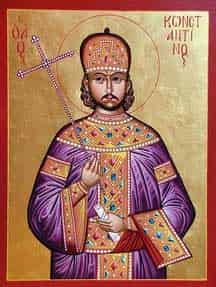Saint Constantine the Great Catholic Saint
- 28-Dec-2023, 19:42
- 5 986


Saint Constantine the Great
Catholic Saint
st.Constantine the Great-Roman emperor and champion of Christianity
Feast Day : May 21
Also known as: Flavius Valerius Constantinus, the Thirteenth Apostle
Birth dates for Constantine range from 274 to 288. He was born at Naissus to Constantius Chlorus, a Roman officer who became junior emperor (r. 293–306), and St. Helena, a woman of inferior lineage. Constantine grew up in the court of Diocletian (r. 284–305) and served in the military. Upon the death of his father in battle in 306, his troops proclaimed him caesar. Diocletian had attempted to establish a four-headed empire, but constant struggle ensued for the supremacy of one person as emperor. Constantine managed to stay out of the infighting until 311, when the emperor Galerius died. In 312 Constantine faced the army of his rival, Maxentius, in a decisive battle at the Milvian Bridge near Rome. He sought out pagan diviners who told him the battle would go badly for him. He then had first a waking vision and then a dream that convinced him that he would win if he invoked the name of Christ. He did and thus defeated Maxentius.
By 325 Constantine defeated the fourth rival, Licinius, and became sole emperor, a position he held until 337. He was preparing to march with his troops against a new enemy when he fell ill and died in March of that year. Constantine was instrumental in stoping the persecutions of Christians, and as sole emperor made Christianity the religion of state. Tradition holds that he did so out of personal experience and conviction, but he also was influenced by the political and social forces of the times. Old ways were falling out of favor. The empire faced barbarian invasions from the north, which sapped resources that had been devoted to persecutions. Constantine combined both paganism and Christianity into his personal life and political affairs. In 330 the dedication of Constantinople, the city he made the capital of the empire, was a mix of both pagan and Christian rites. As he got older, Constantine became increasingly Christian, but did not receive baptism until he was on his deathbed. About 20 years after the death of Constantine, the historian Eusebius recorded an account of the visionnary experiences in 313, saying that Constantine had related them personally to him: Accordingly [Constantine] called on [God] with earnest prayer and supplications that he would reveal to him who he was, and stretch forth his right hand to help him in his present difficulties. And while he was thus praying with fervent entreaty, a most marvelous sign appeared to him from heaven . . .
He said that about noon, when the day was already beginning to decline, he saw with his own eyes the trophy of a cross of light in the heavens, above the sun, and bearing the inscription, CONQUER BY THIS. At this sight he himself was struck with amazement, and his whole army also, which followed him on this expedition, and witnessed the miracle. He said, moreover, that he doubted within himself what the import of this apparition could be. And while he continued to ponder and reason on its meaning, night suddenly came on; then in his sleep the Christ of God appeared to him with the same sign which he had seen in the heavens, and commanded him to make a likeness of that sign . . . and to use it as a safeguard in an engagements with his enemies. At dawn of day he arose, and communicated the marvel to his friends: and then, calling together the workers in gold and precious stones, he sat in the midst of them, and described to them the figure of the sign he had seen, bidding them represent it in gold and precious stones. The sign was the two Greek letters chi (X) and ro (P), the first two letters of Christ’s name, combined one over the other as a monogram. Called the labarum, it became the symbol of the Roman emperors